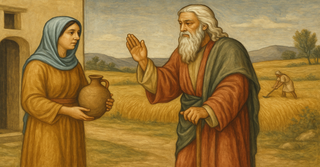A Story of Faith and Miracles: The Story of the Shunammite Woman and Elisha
Share

The Shunammite woman opens her heart and her home to the prophet Elisha in the narrative found in 2 Kings 4:3-37. Her faithfulness and kindness are rewarded when God blesses her with a son. When the son dies as a young boy, God uses Elisha to bring the boy back to life.
Who Was the Shunammite Woman?
Named for her hometown of Shunam (or Shunem in some references) in ancient Israel, she is a well-to-do host to the prophet Elisha whenever he travels through Shunam. Elisha is a powerful prophet and advisor to the kings of Judah in the second half of the 9th century BCE. The Shunammite woman says to her husband, “I know that this man who often comes our way is a holy man of God.” Out of reverence to God and due to her generous nature, she and her husband make a small guest room for Elisha on the roof of their house (2 Kings 4:8-10).
The Shunammite woman serves the Lord’s prophet Elisha with spiritual maturity. When Elisha offers to reward her for her hospitality by speaking to the king or the commander of the army on her behalf, the Shunammite woman says, “‘I have a home among my own people’ (2 Kings 4:13). This statement indicates the woman of Shunam is content with her life as it is.
Elisha’s servant Gehazi, a key character in the narrative, suggests to Elisha that the Shunammite woman needs a son to take care of her when her elderly husband passes. The woman finds Elisha’s announcement—that she will have a son when he visits her the following year—difficult to receive. She is frustrated with her inability to conceive a son thus far.
Yet indeed, she has a son, whom Elisha raises from the dead when the young son dies after falling ill while outside with the reapers. In this, the Shunammite woman is doubly blessed by God through Elisha.
How Does the Shunammite Woman's Story Fit into the Larger Biblical Narrative?
The miracle of a child born to a previously barren woman is part of the Shunammite woman’s story and is also in the Bible narratives of Abraham and Sarah, Isaac and Rebekah, and Jacob and Rachel. Abraham was called by God to grow and flourish the nation of Israel. Unfortunately, some of his descendants were unable to have children for a time. These biblical figures who experienced infertility worry they will never have children for their own joy and to increase the lineage of God’s chosen people.
In fact, “Rachel weeping for her children” (Jeremiah 31:15) expresses how the sorrow of Jacob’s wife Rachel is reiterated in the lives of Israeli women who lost children in the furor of the Babylonian captivity. Yet Jeremiah prophesies that the Lord will plant the houses of Israel and Judah with offspring (Jeremiah 31:27). And all of Abraham’s descendants eventually bore children.
The joyous miracle of a previously barren woman giving birth foreshadows the birth of Jesus to the young virgin Mary. Her womb is also empty before the Holy Spirit blessed her with God’s son.
Another great set of miracles related to the Shunammite woman’s story is in the Bible accounts of children raised from the dead. This miracle alludes to Jesus’ rising from the dead. Besides Mary, the list of parents experiencing this joy includes the widow of Zarephath, whose son is brought back to life with prayers from the prophet Elijah in a narrative similar to that of the Shunammite woman and Elisha. The widow of Zarepath shows long-term hospitality to Elijah when she is destitute and suicidal. Her son sickens and dies, and Elisha raises him from the dead by stretching across his lifeless body, as Elisha did to the Shunammite woman’s son (1 Kings 17:8-24). And the widow makes the same statement to Elijah as the Shunammite woman made regarding Elisha: “You are indeed a man of God!” (1 Kings 17:8-24).
In Jesus’ New Testament ministry, He revives the synagogue leader Jairus’ daughter. Jesus goes to the twelve-year-old girl and says, “Talitha koum!” which means “Little girl, I say to you, get up!” according to a footnote in the New International Version Study Bible (Kenneth Barker, editor. Zondervan, Grand Rapids. 2020). The girl rises and walks about to the astonishment of her parents and three of Jesus’ disciples (Mark 5:21-24, 35-43).
What Miracle Does Elisha Perform for the Shunammite Woman?
The Shunammite woman’s beloved son becomes ill with head pain after being out in the sun with reapers and dies. The Shunammite woman rushes by donkey to Elisha in Mt. Carmel, a twenty-five-mile journey to seek Elisha’s help. She keeps the purpose of her trip a secret from her husband, saying, “It’s all right” (2 Kings 4:23b). Like Mary, Jesus’ mother, she “keeps all these things in her heart” (Luke 2:19). The Shunammite woman’s husband questions her regarding the timing of her visit. This question indicates the holy woman makes regular pilgrimages to Mt. Carmel to see Elisha, and this was not at the normal time.
Elisha’s servant Gehazi attempts to push away the Shunammite woman when she arrives in Mt. Carmel, but Elisha is deeply concerned for her and asks if everyone is alright. Once again, the Shunammite woman is stoic, claiming “Everything is all right.” (2 Kings 4:26). When the truth comes out, Elisha makes a dash for Shunam with the widow, sending Gehazi ahead with a staff to lay across the deceased boy’s body.
Elisha lays himself across the deceased son’s lifeless body at the woman’s home in Shunam. The boy sneezes several times and comes back to life. His parents enter the room and Elisha hands the boy to his mother. It is a miracle.
The Shunammite woman thanks Elisha for saving her son. She bows to Elisha, who, as God’s prophet, has brought her son back to life.
Lessons from the Shunammite Woman's Faith
The Shunammite woman’s faith is largely private. She is outwardly hospitable but keeps her thoughts to herself. She doesn’t even tell her husband why she is racing off to Mt. Carmel to summon Elisha. He must have figured out her intentions when Gehazi and then his wife and Elisha burst into their home. And no doubt the Shunammite woman’s husband is then aware that his wife is taking action to bring their son back to life.
The Shunammite woman is private to the point of being stoic. She says everything is all right in 2 Kings 4, verses 23 and 26, in response to her husband’s and the servant Gehazi’s questions. Perhaps this is a way for her to operate more efficiently, acting quickly in her pursuit of Elisha rather than taking time to explain the situation.
When she finally meets Elisha, she is more honest with her feelings. In 2 Kings 4:28 she says to Elisha, “Did I ask you for a son, my lord?” she said. “Didn’t I tell you, ‘Don’t raise my hopes?'” This is as close as the Shunammite woman comes to finding blame in her grief. A feeling of unfairness or punishment from God often accompanies grief, and she is no exception. As Matthew Henry’s commentary on this passage is recorded in a Bible Study Tools article: “When any creature-comfort is taken from us, it is well if we can say, through grace, that we did not set our hearts too much upon it; for if we did, we have reason to fear it was given in anger and taken away in wrath.”
The Shunammite woman maintains a strong faith in God and His prophet Elisha. She makes pilgrimages to Elisha in Mt. Carmel and holds his feet when she appeals to him to save her son. She bows to him after he heals her son. And before Elisha works this miracle, the Shunammite woman refers to Elisha as a “man of God” (2 Kings 4:9, 23, 27, and 37).
The Shunammite woman offers this man of God a place to stay and nourishment. This is a sign of her godliness. And certainly, the hospitality of the Shunammite woman is an integral part of Jesus’ message to his disciples and us when he said, “’For I was hungry and you gave me something to eat, I was thirsty and you gave me something to drink, I was a stranger and you invited me in . . . Truly I tell you, whatever you did for one of the least of these brothers and sisters of mine, you did for me’” (Matthew 25:35 and 40). The Shunammite Woman follows this principle when she says in 2 Kings 4:10, “. . . he can stay there [in the guest room] whenever he comes to us.”
We can emulate the Shunammite woman’s spirit of hospitality, welcoming people, whether to our homes or to our community and places of worship. It is likely that the guests will bless us richly in the manner of Elisha. Some people we meet are “angels unaware” (Hebrews 13:2), sent by God to enrich our lives.
Image created using AI technology and subsequently edited and reviewed by our editorial team.
